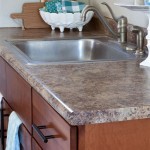How To Clean Black Quartz Countertops
Black quartz countertops are a popular choice for modern kitchens and bathrooms, admired for their sleek aesthetic and durability. However, like any surface, they require regular cleaning to maintain their luster and prevent the buildup of stains or grime. This article provides a comprehensive guide on how to effectively clean black quartz countertops, ensuring their longevity and beauty.
Quartz countertops are engineered stone, composed primarily of ground quartz combined with resins and pigments. This composition makes them non-porous, resisting staining and bacterial growth more effectively than natural stone like granite or marble. While quartz is inherently durable, it's crucial to use appropriate cleaning methods to avoid damaging the surface. Harsh chemicals, abrasive cleaners, and excessive heat can dull the finish or even cause discoloration.
Daily Cleaning Practices for Black Quartz Countertops
Implementing a routine of daily cleaning is the most effective way to prevent stains and buildup on black quartz countertops. This involves wiping down the surfaces after each use, or at least once a day, to remove spills and food residue. Promptly addressing spills is especially important, as some substances can leave stains if left to sit for extended periods.
The best tool for daily cleaning is a soft microfiber cloth. These cloths are non-abrasive and effectively lift dirt and grime without scratching the surface. Avoid using scouring pads, steel wool, or other abrasive materials, as they can permanently damage the finish of the quartz.
For a daily cleaning solution, warm water and a mild dish soap are usually sufficient. Mix a small amount of dish soap with warm water in a spray bottle or a bowl. Spray the solution onto the countertop or apply it with a damp microfiber cloth. Wipe the surface thoroughly, paying attention to areas with spills or food residue. After wiping, rinse the countertop with a clean, damp microfiber cloth to remove any soap residue. Finally, dry the surface with a clean, dry microfiber cloth to prevent water spots.
Alternatively, commercially available quartz cleaners are also suitable for daily cleaning. Ensure that the cleaner is specifically designed for quartz surfaces and follow the manufacturer's instructions. Avoid using cleaners that contain harsh chemicals such as bleach, ammonia, or strong solvents, as these can damage the quartz over time.
Removing Stubborn Stains from Black Quartz Countertops
Despite their non-porous nature, quartz countertops can still develop stubborn stains from substances like coffee, wine, grease, or hard water. Removing these stains requires a more targeted approach than daily cleaning.
For grease stains, start by blotting the area with a clean paper towel to absorb as much grease as possible. Then, apply a paste of baking soda and water to the stain. Let the paste sit for 10-15 minutes to absorb the remaining grease. Gently scrub the area with a soft, damp cloth and rinse thoroughly with water. Dry the surface with a clean cloth.
For coffee, wine, or hard water stains, try using a mixture of white vinegar and water. Dilute the vinegar with water in a 1:1 ratio. Spray the solution onto the stain and let it sit for a few minutes. Wipe the area with a damp microfiber cloth and rinse thoroughly with water. Dry the surface with a clean cloth. Vinegar is a mild acid and can effectively dissolve many types of stains. However, it is important to dilute it with water to prevent damage to the quartz surface.
For particularly stubborn stains that do not respond to baking soda or vinegar, a specialized quartz stain remover may be necessary. These products are specifically formulated to remove tough stains from quartz surfaces without causing damage. Always follow the manufacturer's instructions when using a stain remover. Test the product on an inconspicuous area of the countertop first to ensure it does not cause discoloration or damage.
Another option for removing stubborn stains is using a plastic scraper or putty knife. Carefully scrape away the stain, holding the scraper at a shallow angle to avoid scratching the quartz. Use a gentle, consistent pressure and avoid pressing too hard. Once the stain is removed, wipe the area with a damp microfiber cloth and dry the surface with a clean cloth.
Preventative Measures and Long-Term Maintenance for Black Quartz
Beyond daily cleaning and stain removal, several preventative measures can help maintain the beauty and longevity of black quartz countertops.
Always use cutting boards when preparing food. While quartz is scratch-resistant, it is not completely scratch-proof. Using cutting boards protects the countertop from scratches caused by knives and other sharp objects. Furthermore, cutting boards prevent contamination of the countertop with raw meat or other potentially harmful substances.
Use trivets or hot pads under hot pots and pans. Although quartz is heat-resistant, prolonged exposure to high heat can cause discoloration or damage. Placing hot items directly on the countertop can also weaken the resin that binds the quartz particles together, leading to cracks or chips. Trivets and hot pads provide a barrier between the hot item and the countertop, preventing heat damage.
Avoid using harsh chemicals or abrasive cleaners. As previously mentioned, harsh chemicals like bleach, ammonia, and strong solvents can damage the finish of the quartz. Abrasive cleaners like scouring pads and steel wool can scratch the surface. Stick to mild dish soap, warm water, vinegar, or specialized quartz cleaners for regular cleaning.
Protect the countertop from direct sunlight. Prolonged exposure to direct sunlight can cause fading or discoloration over time, especially on darker colors like black. If the countertop is located near a window, consider using blinds or curtains to filter the sunlight.
Consider applying a quartz sealant or polish periodically. While quartz is non-porous, applying a sealant or polish can provide an extra layer of protection against stains and scratches. These products also enhance the shine and luster of the countertop. Follow the manufacturer's instructions when applying a sealant or polish, and be sure to test it on an inconspicuous area first.
Regularly inspect the countertop for any signs of damage, such as cracks, chips, or discoloration. Addressing these issues promptly can prevent them from becoming more serious. If you notice any significant damage, consult a qualified quartz countertop repair specialist.
By following these cleaning and maintenance guidelines, black quartz countertops can remain beautiful and functional for many years to come. Regular cleaning, prompt stain removal, and preventative measures are key to preserving the integrity and appearance of this popular countertop material.

How To Clean Black Quartz Countertops Full Cleaning Guide

How To Polish Quartz Countertops Granite 4 Less

Maintaining The Black Quartz Countertop Brilliance

Cloudy Blotches On Silestone Countertop

Cleaning And Caring For Black Marble Countertops Countertop In Oak Creek Wisconsin Granite Quartz Franklin Waukesha New Berlin Muskego Milwaukee Area

Cleaning And Caring For Quartz Countertops A Step By Guide Granite Selection

How To Clean Quartz Countertops Care For Your Custom Counters

Best Black Quartz Countertops Ideas For Your Kitchen

The Best Guide For How To Clean Quartz Countertops

The Best Way To Clean Quartz Countertops Fast Caesarstone Us
See Also








